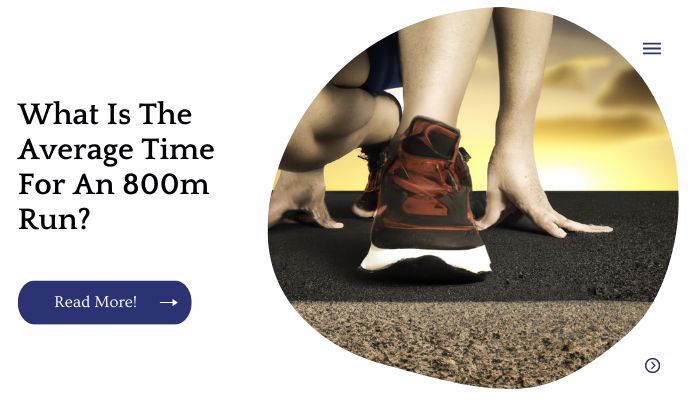Running is a great way to burn calories and get in shape. It’s also one of the most popular sports around the world.
If you’re interested in learning how to run or improve your running speed, let us tell you all about it! We’ll cover everything from what is the average time for an 800m run? to why some people are faster at running than others.
| Takeaways |
|---|
| The average time for an 800m run can vary depending on factors such as age, gender, training level, and competition standards. |
| For competitive male athletes, a time below 2 minutes is generally considered excellent. |
| For female athletes, a time below 2 minutes and 20 seconds is highly competitive. |
| Training strategies for improving 800m performance include aerobic base building, interval training, speed workouts, and strength training. |
| Proper race pacing techniques, such as starting slightly slower and gradually increasing effort, are crucial for successful 800m runs. |
| Efficient running techniques, including maintaining good posture, utilizing arm swing, proper breathing, and optimizing stride length and cadence, can enhance performance. |
| Consistency, practice, and following a structured training program can help athletes achieve their goals in the 800m run. |
What Is The Average Time For An 800m Run?
The average time for an 800m run depends on many factors. For example, some people are naturally faster than others and will have a lower time.
A 12-year-old boy might get longer first time, but some adults cannot even run that far without stopping to walk or rest.
Professional athletes can go much faster because they have trained their bodies to be more efficient at running. However on average its 3’16” to 3’30”
When it comes to tent camping, understanding the optimal duration is essential for a memorable outdoor experience. Discover the secrets of successful tent camping in our comprehensive guide on how long you can tent camp.
How Long Does It Take To Run 800 Meters?
It takes about two minutes to run 800 meters. This depends on your speed and fitness level, but it can be a great benchmark for measuring progress in training.
It’s also a common distance for races and is used as a training distance by many professional athletes.
For example, if you’re preparing for an upcoming half marathon race and want to improve your time over the course of several weeks or months, you could set yourself up with a goal of running each training session closer to an average pace that would allow you to finish within one minute per 400 meters that’s about 87 seconds per lap around most tracks.
| Category | Average Time (Minutes:Seconds) |
|---|---|
| Elite Athletes | 1:40 – 1:45 |
| Competitive Runners | 2:00 – 2:30 |
| Recreational Runners | 2:30 – 3:30 |
| Beginners | 3:30+ |
Why Are Some People Faster At Running Than Others?
Generally speaking, there are more factors involved than just genetics when it comes to how fast you can run an 800-meter race.
There are also training and lifestyle habits that play a role in determining your speed. Your motivation to be faster at running will also contribute to your overall performance as a runner.
But if we’re talking about the physiological side of things, then we need to look at your body type; gender matters too!
Worn-out running shoes can hinder your performance and increase the risk of injuries. Learn more about the importance of proper shoe maintenance and find out how often you should change your running shoes to ensure optimal performance and injury prevention.
Is There Any Difference Between Men And Women When It Comes To Running?
There are some differences between men and women when it comes to running. Men tend to be taller and heavier than women, which may make them slower at first but also allows them to run longer distances with less fatigue.
Women are typically shorter and lighter than men, but this gives them an advantage in speed events like sprinting because they have a lower center of gravity that makes it easier for them to accelerate quickly out of the starting blocks.
Both men’s and women’s VO2 max values are roughly similar though, which means that both genders experience similar levels of aerobic fitness when they reach their maximum heart rate (HRmax).
Why Do People Like Running As Opposed To Other Types Of Exercise?
The reason that people enjoy running is because it’s easy to do, it’s a great way to stay in shape and you can do it anywhere with anyone.
Running is also enjoyable because of the sense of freedom and accomplishment that comes with completing your first mile or two without stopping.
It can be very rewarding to know that you can accomplish something so difficult like running many miles without stopping.
How Do You Know If You’re Going Too Fast Or Too Slow During A Race?
If you find yourself in an 800-meter race, it’s important to know how long the distance is and how fast you should be running it.
You will also want to figure out whether or not you are on pace with other runners in your class. The easiest way to do this is by using a stopwatch app on your phone or a timer that can be set for one minute (this will help cut down on distractions).
| Signs of Going Too Fast | Signs of Going Too Slow |
|---|---|
| Starting too quickly and feeling fatigued early on | Feeling excessively relaxed or having low effort |
| Breathing heavily and struggling to maintain pace | Not experiencing a challenge or lack of intensity |
| Muscles feeling strained or fatigued sooner than expected | Having an excess of energy toward the end of the race |
| Inability to maintain a consistent pace | Feeling bored or disengaged due to a lack of challenge |
| Heart rate significantly higher than normal | Finishing the race with too much energy remaining |
What Are The Benefits Of Doing An 800-Meter Run Every Day?
Cardiovascular health. Running is one of the best ways to improve your cardiovascular health, which includes things like your heart rate, blood pressure and lung capacity. Running also helps reduce stress levels and improves mood by releasing endorphins into the body.
Strengthen bones. Running builds bone mass due to the impact on your feet as you run, which can help prevent osteoporosis later in life.
Improve sleep quality. Running before bed can help you fall asleep faster because it lowers adrenaline levels in the body before bedtime, allowing you to get more restful sleep throughout the night.
A comfortable camping pad can make a world of difference in your outdoor adventures. Discover easy step-by-step instructions on how to make your own camping pad and enjoy a restful night’s sleep under the stars.
How Long Should It Take To Prepare For An 800-Meter Run?
It depends on your current fitness level and how much time you have to train. For example, if you are already in great shape but don’t have much time to train before the race, it might take just a few weeks of training before you’re ready to run your best time ever.
If you’re starting from scratch and need more time to build up your endurance level, then it could take several months or even a year before you can hit your personal best on an 800-meter race course.
In either case, however, there’s no need to rush things when it comes down to preparation for an 800-meter run! Remember:
The best way for anyone who wants their body and mind prepared for this type of event is through consistent practice over long periods of time rather than trying too hard at once (and probably ending up injured).
Choosing the right running boots is crucial for achieving optimal performance and comfort. Learn from firsthand experiences and expert insights in our article on what boots are good for running to find the perfect footwear for your running endeavors.
Is It Important To Stretch Before Doing An 800-Meter Run? Why Or Why Not?
Stretching before running helps to prevent injury by improving your flexibility, which allows you to run with more range of motion.
If you have tight muscles and joints, they are more likely to be injured when they are forced beyond their normal range of movement during exercise.
Stretching after running helps prevent soreness by increasing blood flow to the muscles and preventing stagnant lactic acid buildup in your body.
As a bonus, stretching at any time of the day can help improve circulation and boost energy levels, making it an excellent practice for everyone!
| Stretching | Importance |
|---|---|
| Dynamic Stretching | Recommended |
| Static Stretching | Controversial |
| Foam Rolling | Beneficial |
| Active Warm-up Exercises | Important |
| Pre-run Mobility Drills | Helpful |
Grilling delicious meals is an integral part of the camping experience. Our guide on how to use a camping charcoal grill provides valuable tips and techniques to help you master outdoor cooking and elevate your camping cuisine.
Conclusion
If you’re ready to take your running game to the next level, then we hope this article has given you some ideas on how to improve your performance.
We know it can be tough sometimes to motivate yourself or stick with an exercise routine, but don’t give up! Remember: first steps are always the hardest.
Take things slow and steady, focus on what works for YOU (and not what works for someone else), and enjoy yourself along the way!
Further Reading
- Topend Sports: 800m Run Testing: Explore the detailed information and testing protocols for the 800m run, a challenging middle-distance race in track and field.
- PT Direct: 300m-800m Sprint – A Predictive Test of Anaerobic Capacity Endurance: Discover how the 300m-800m sprint test can assess anaerobic capacity and endurance, providing valuable insights for training and performance improvement.
- LetsRun Forum: 800m Run Discussion: Join the conversation on the LetsRun forum and engage with fellow athletes, coaches, and enthusiasts discussing various aspects of the 800m run, including training strategies, race tactics, and more.
And here’s the FAQs section in H2 with five questions and answers:
FAQs
How long is an 800m run?
The 800m run is a middle-distance race that covers two laps around a standard outdoor track, totaling approximately 800 meters or half a mile.
What is a good time for an 800m run?
A good time for an 800m run depends on various factors such as age, gender, training level, and competition standards. However, for competitive male athletes, a time below 2 minutes is generally considered excellent, while for female athletes, a time below 2 minutes and 20 seconds is highly competitive.
What are some effective training strategies for improving 800m performance?
Effective training strategies for improving 800m performance include a combination of aerobic base building, interval training, speed workouts, strength training, and proper race pacing techniques. Working with a coach or following a structured training program can help optimize performance.
How should I approach race pacing in the 800m?
Race pacing in the 800m requires a balance between conserving energy for the first lap and unleashing a strong finish in the second lap. Many athletes adopt a strategy of running the first lap slightly slower than their target pace and then gradually increasing their effort in the second lap.
Are there any specific techniques for running the 800m efficiently?
Efficient running techniques for the 800m include maintaining an upright posture, utilizing arm swing for momentum, employing proper breathing techniques, and executing efficient stride length and cadence. Regular practice, drills, and form-focused exercises can help improve technique and efficiency.

Hellen James is an outdoor enthusiast, writer, and hiker. She loves to explore the world around her by immersing herself in nature and visiting new places.


